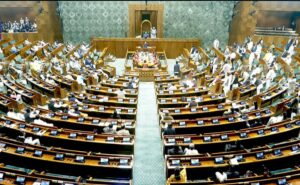House Democrats demand big bank CEOs disclose documents about small business loans in coronavirus bailout

Jamie Dimon, CEO, JP Morgan Chase, speaking at the Business Roundtable CEO Innovation Summit, December 6, 2018.
Janhvi Bhojwani | CNBC
House Democrats on Monday wrote to the chief executives of some of the country’s largest banks demanding they disclose documents pertaining to their handling of the federal government’s small business bailout loan program.
In letters to the CEOs of JPMorgan Chase, Bank of America, Santander Bank, Wells Fargo, US Bancorp, Truist, Citibank and PNC, House Majority Whip James Clyburn said the subcommittee on the coronavirus crisis is investigating whether the Paycheck Protection Program “has favored large, well-funded companies over struggling small businesses in underserved communities — contrary to Congress’ clear intent.”
The Democrats also wrote to Treasury Secretary Steven Mnuchin and Small Business Administration head Jovita Carranza requesting their own correspondence with the banks, as well as trade groups such as the American Bankers Association and the U.S. Chamber of Commerce.
The PPP was established as part of the more than $2 trillion CARES Act to offer forgivable loans for smaller businesses that were hammered by the pandemic. But the program has come under fire amid concerns that it favored larger companies over those without relationships with banks.
Some banks have argued that lending to existing clients helped them lend out the loans at the rapid speed expected of them.
“We are writing to seek documents and information and to urge the Treasury Department and Small Business Administration to take immediate steps to ensure that remaining PPP funds are allocated to businesses truly in need, and to increase transparency so taxpayers can see whether federal funds are being diverted due to waste, fraud, and abuse,” wrote Clyburn and other Democrats.
The Democrats joined a growing chorus of critics of Mnuchin’s statement last week that the administration does not plan to disclose the names of those who took out loans from the program. The House Democrats demanded in their letter that the SBA and Treasury disclose a list of all PPP applications received and loans they have issued.
Mnuchin tweeted Monday that he would be discussing PPP oversight and disclosure with lawmakers on both sides of the aisle.
As of Friday, the PPP has supported 4.5 million loans for a total loan value of $512 billion, with roughly $130 billion still to be spent. 65% of the loans it has extended so far are for less than $50,000.
In letters to bank executives, the lawmakers said they are seeking a number of materials from the banks, including “all formal or informal guidance” from the Treasury or SBA about PPP requirements and communication with the departments about the “prioritization or exclusion” of loan applicants in underserved or rural markets.
They also requested “all internal communications” and policies pertaining to the program.
The letter notes that the SBA and Treasury, which are overseeing the program, “did not provide any public guidance to lenders until nearly two weeks after lenders started processing loan applications, and just a day before the initial round of funding dried up.”
“Despite Congress’ clear intent,” wrote Clyburn and other Democrats, “this guidance made no mention of prioritizing loans to underserved communities.”
“We have significant concerns that the two-tiered system that some banks reportedly developed for wealthy clients may have diverted PPP funds intended for vulnerable small business owners in underserved and rural markets, including small businesses owned by veterans, members of the military, socially and economically disadvantaged individuals, women, and businesses in operation for under two years,” the letter said.
“We urge you to take immediate steps to ensure that your bank prioritizes underserved communities when issuing PPP loans going forward.”
A spokesperson for Wells Fargo said it has loaned $10.2 billion to 168,000 applicants through the program. The bank added that more than 80% of that funding went to companies with 10 or fewer employees, and more than 50% were for $25,000 or less.
“Wells Fargo will give away all fees received from the PPP to help small businesses in communities of need,” the bank said.
A spokesperson for Truist said the bank’s PPP applications were “handled through a single application portal made available to clients on a first-come, first access basis, without any preference given to larger or more affluent clients.” The bank said that − to date − 92% of its PPP loans have gone to companies with fewer than 50 employees.
“We look forward to providing information to the select subcommittee as we believe in fairness, accountability and transparency in connection with the PPP,” the spokesperson added.
A spokesperson for US Bancorp said “from day one, the focus at U.S. Bank was on serving the needs of as many small businesses that we could.” The bank said it has processed more than 90,000 SBA-approved loans for an average loan size of $77,000 – with 86% of the approved loans for less than $100,000. Companies self-reported an average of nine employees.
Representatives for the other banks, the SBA and Treasury didn’t immediately respond to requests for comment.






